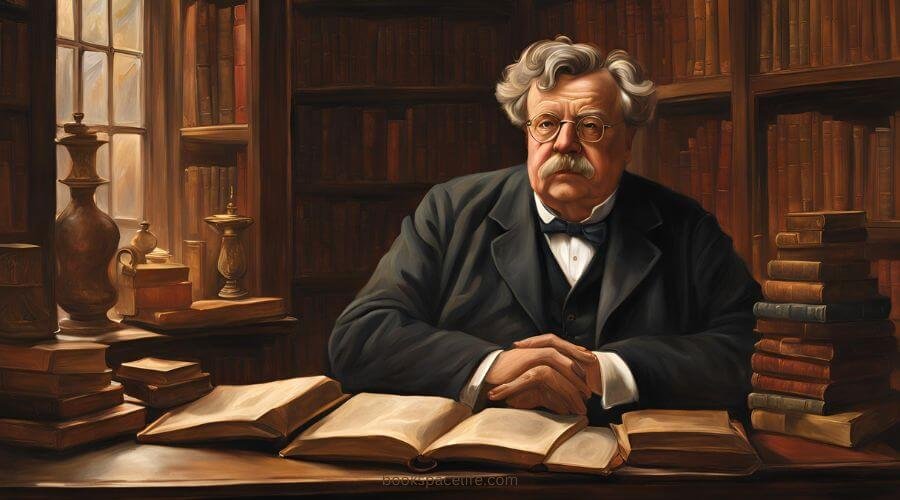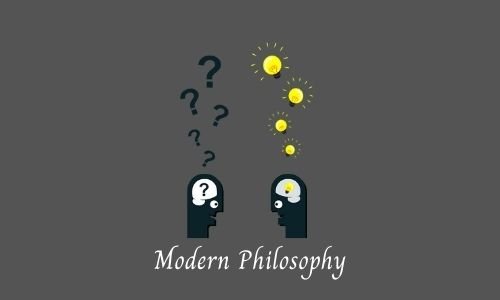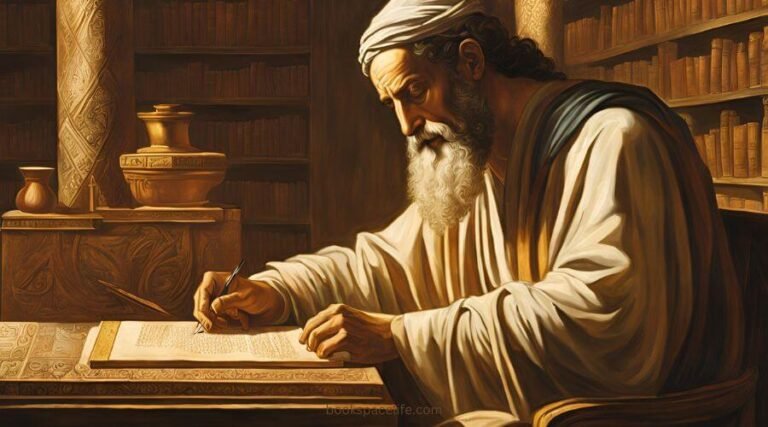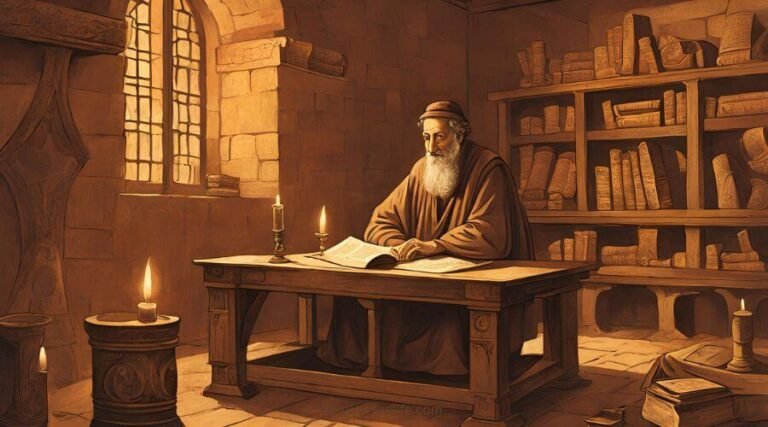Philo of Alexandria
G.K. Chesterton: The Prince of Paradox and Champion of Christian Thought
G.K. Chesterton (1874 – 1936 CE) is widely regarded as one of the most important and influential figures in early 20th-century British intellectual life.
Known for his wit, humor, and profound insights into religion, politics, and society, Chesterton was a prolific writer whose works spanned a wide range of genres, from philosophy and theology to detective fiction and social commentary.
His unique style, characterized by paradoxical reasoning and an affection for tradition, earned him the title of “the prince of paradox.”
Chesterton’s influence extended far beyond literature and philosophy, shaping the cultural and theological conversations of his time.
A committed Christian, he became one of the foremost defenders of traditional Christian values and beliefs in an age increasingly dominated by secularism, relativism, and materialism.
His works continue to inspire thinkers and readers across the world, with his philosophical ideas and critiques of modernity remaining relevant to contemporary discussions.
This blog post delves into the life, travels, education, philosophy, and lasting impact of G.K. Chesterton, examining how his unique worldview shaped his writing and legacy.
Table of Contents
(1) Early Life and Education
Gilbert Keith Chesterton was born on May 29, 1874, in London, into a middle-class family. His father, Edward Chesterton, was a businessman, and his mother, Marie Louise (née Grosjean), was a woman of French descent. Gilbert, known as “G.K.” throughout his life, was the youngest of four children.
Though his family was not particularly religious, Chesterton developed a deep and lasting connection to faith, which would become a central theme in his later life and work.
Chesterton’s early education took place at St. Paul’s School in London, and later at The Slade School of Fine Art, where he trained as an artist. Initially intending to pursue a career as a painter, Chesterton’s education at The Slade School proved formative.
While he found success as an artist, he eventually gravitated toward writing as his primary form of expression.
It was during this time that Chesterton became deeply engaged in literature and philosophy, particularly the works of major European thinkers.
Chesterton did not attend university, which was somewhat unusual for a man of his intellectual stature.
Nevertheless, his personal thirst for knowledge was insatiable. His self-education was aided by an expansive reading habit, drawing from the works of the Great Books of Western civilization, ranging from Homer and Shakespeare to Descartes and Kant.
He immersed himself in the philosophy of Thomas Aquinas and John Henry Newman, both of whom would later influence his own theological perspectives.
(2) Early Career and Intellectual Development
Chesterton began his professional career as a writer and journalist in the late 1890s. He initially worked for the “Illustrated London News”, where he began to develop a reputation for his sharp, satirical style and his deep knowledge of philosophy and literature.
His first major published work, “The Man Who Was Thursday” (1908), was a philosophical novel that combined elements of detective fiction, mysticism, and social critique.
The book embodied many of Chesterton’s core themes, such as the tension between chaos and order, and the complex relationship between individualism and society.
Chesterton’s early career was marked by his increasing involvement in debates about modernism and secularism.
At the turn of the 20th century, British intellectual life was dominated by a rising tide of secularism, materialism, and utilitarian philosophy, often led by figures like Herbert Spencer and John Stuart Mill.
Chesterton was deeply concerned with the intellectual trends of the time, which he viewed as overly reductionist and dismissive of religion, beauty, and the deeper truths of human experience.
He was drawn to the ideas of John Henry Newman and the Christian philosophical tradition, eventually converting to Catholicism in 1922, a decision that greatly influenced his later works and theological writings.
His conversion marked a turning point in his intellectual and personal life, leading him to become one of the most eloquent defenders of Christian orthodoxy in the early 20th century.
(3) Philosophy and Worldview
Chesterton’s philosophy was characterized by a unique blend of Christian apologetics, social criticism, and literary creativity.
He rejected the modernist tendencies of his time and sought to reclaim the transcendent values of faith, tradition, and moral order. His views on reason and imagination, faith and doubt, were central to his thought, and he articulated these ideas in many of his works, including “Orthodoxy” (1908) and “The Everlasting Man” (1925).
(i) Christianity and Paradox
One of Chesterton’s most distinctive contributions to philosophy and theology was his embrace of paradox. Chesterton argued that paradox was not a flaw in reason but rather a necessary aspect of truth. His well-known paradoxes—such as “the most extraordinary thing about Christianity is that it’s true”—were used to illustrate the complexity and profundity of Christian belief.
For Chesterton, Christianity was the ultimate answer to the intellectual and spiritual crises of modernity. He believed that modern philosophers and scientists had tried to reduce the complexity of existence to simple, mechanistic explanations, neglecting the mystery and awe that comes with the experience of life itself. Chesterton viewed the Christian doctrine of creation, redemption, and divine mystery as offering a much richer and more meaningful interpretation of reality than any purely secular worldview.
(ii) Defense of Tradition and the Common Good
Chesterton was a fierce critic of modern industrial capitalism and the rise of secular liberalism. He was deeply concerned about the effects of individualism and materialism on society and the family. He argued that in modern times, people had lost their sense of connection to their communities, their traditions, and their deeper moral obligations.
He famously championed the idea of distributism, an economic system that advocates for the widespread ownership of property and the decentralization of power. Distributism stood in contrast to both socialism and laissez-faire capitalism, which Chesterton saw as contributing to social inequality, poverty, and the breakdown of community life. In his vision, a society built on widespread ownership of property and personal responsibility would create a more just and humane world.
(iii) The Role of Imagination and Storytelling
Chesterton believed that imagination and storytelling were central to the human experience. As a writer of novels, essays, and poetry, he frequently used fiction as a means to express complex philosophical ideas. His most famous fictional creation, the character of Father Brown, a humble priest-detective, became a beloved figure in detective literature. The Father Brown stories were not just entertaining mysteries but philosophical explorations of morality, justice, and human nature.
In his non-fiction works, Chesterton often emphasized the importance of myth, legend, and storytelling as tools for conveying moral and spiritual truths. He believed that the best way to understand the world was not through dry, scientific analysis alone, but through the imaginative and symbolic narratives that shape our cultural and religious traditions.
(4) Influence and Impact
G.K. Chesterton’s impact on both philosophy and popular culture cannot be overstated. He was a master of multiple genres, and his writings—spanning philosophy, theology, politics, fiction, and poetry—shaped not only intellectual life in Britain but also the broader cultural and religious landscape.
(i) Literary Legacy
Chesterton’s literary output was immense. In addition to his detective fiction, he wrote numerous essays, books, and articles that continue to be studied and appreciated. His most famous works, such as “Orthodoxy”, “The Everlasting Man”, and “Heretics”, are considered classics of Christian apologetics. In these works, Chesterton responded to the challenges posed by atheism, materialism, and modernity, offering a robust defense of Christianity as a coherent, rational, and life-affirming worldview.
(ii) Catholic Apologetics
Chesterton’s conversion to Catholicism had a profound impact on the intellectual and spiritual world. As a public figure, he defended the Catholic faith against critics from both secular and Protestant perspectives. His “The Everlasting Man” is often regarded as one of the greatest defenses of Christianity ever written, and it had a significant influence on other Catholic thinkers, such as C.S. Lewis, who admired Chesterton’s ability to articulate the Christian faith with both intellectual rigor and emotional appeal.
(iii) Social and Political Thought
Chesterton’s advocacy for distributism influenced numerous social reformers in the 20th century. Though the system never gained widespread political traction, his critique of both capitalism and socialism resonated with those who sought alternatives to the prevailing economic systems of his time.
(iv) Cultural Critique
Chesterton’s critique of modernism, secularism, and the loss of tradition remains an important part of his legacy. His belief in the importance of mystery, faith, and wonder in life stands as a powerful antidote to the reductionist and mechanistic worldviews that dominate much of contemporary thought.
(5) Conclusion
G.K. Chesterton was a philosopher, writer, and Christian apologist whose wit, intellect, and deep sense of morality continue to influence thinkers, writers, and theologians today.
His ability to combine humor, paradox, and profound insight into the human condition made him a towering figure in early 20th-century intellectual life.
Chesterton’s works, from his defense of Christianity to his social and political commentary, continue to inspire generations of readers who seek to understand the complex relationship between faith, reason, and society.
Whether through his philosophical essays, his detective fiction, or his impassioned defense of tradition, Chesterton’s ideas remain as relevant today as they were when he first wrote them.








